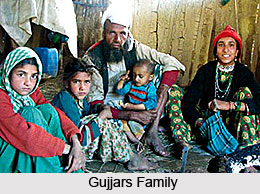 Basically, two groups of Gujjars have been identified - one the Bakarwals and the other group is that of the Van Gujjars. In contrast to the Bakarwals who herd the goat the Van Gurjars in India herd a small, tough and hybrid variety of the buffalo. The Van Gujjars are vegetarian and depend entirely on the forest produce and the milk or milk products of the hybrid buffalo. The buffalo is an extremely prized animal for the Van Gujjars in India. They consider the buffalo an individual in its own right with appropriate name by which it is called as well as known.
Basically, two groups of Gujjars have been identified - one the Bakarwals and the other group is that of the Van Gujjars. In contrast to the Bakarwals who herd the goat the Van Gurjars in India herd a small, tough and hybrid variety of the buffalo. The Van Gujjars are vegetarian and depend entirely on the forest produce and the milk or milk products of the hybrid buffalo. The buffalo is an extremely prized animal for the Van Gujjars in India. They consider the buffalo an individual in its own right with appropriate name by which it is called as well as known.
The Van Gujjars in India spend the autumn (that is approximately October to April) in the Shivalik hills and the summer and the rainy season (May to September) in the higher pastures of the Himalayas. Migrations between these grazing zones take up to three months. They are completely dependent on the forests for their needs of fodder, fuel wood, thatching material and timber for their huts. The Van Gujjars are also known as `forest Gujjars`. They are mostly found in the Shivalik hills area of the northern region of India. They basically follow Islam. Van Gujjars have their own clans that are quite similar to the gotras in Hinduism. They are considered as a rural semi-nomadic community.
The Van Gujjars in India have had numerous conflicts with the forest authorities, who banned livestock populations inside the Rajaji National Park (RNP). The forest authorities also blamed the Van Gujjars for poaching as well as timber smuggling. After the creation of this park, they were asked to shift their base to a resettlement colony near Haridwar. The Van Gujjars are like any other wild animal of the forests and know how to protect themselves against attacks from carnivorous animals. They have their own warning sounds and all of them gather together in a circle to fend off any attack.
The Van Gujjars of the Rajaji National Park (RNP) live in homesteads called the `deras`. Each house is built from the forest material on a clearing in the forests. The van Gujjars live and move in joint family groups set up temporary settlements where the grazing is good. Men graze the animals and sell the milk and the women do the other household chores. The men wear a turban, a lose tahmet (sarong) and generally have a flowing long beard. Some wear embroidered waistcoats. The women wear a long kurta (shirt), churidar (tight pyjamas), and jackets. Van Gujjars speak Gurjari or Gojri, a dialect of Hindi language. Many speak Urdu language, Kashmiri language, Pahari or Dogri as well. They are a monogamy and patriarchal society. Milk and cornmeal are their staple food and they are strict vegetarians. The Van Gurjars in India relate the Judeo-Christian and traditional Islamic story of Esau as their justification for forest dwelling and vegetarianism.




















